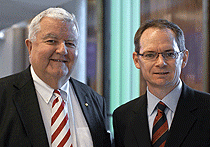Nanomedicine's disease hope
Australia's Chief Scientist, Professor Ian Chubb, has launched the Australian Centre for Nanomedicine at UNSW - the first research centre of its kind in the nation.
Australia's Chief Scientist, Professor Ian Chubb, has launched the Australian Centre for Nanomedicine at UNSW - the first research centre of its kind in the nation.

A new nanomedicine centre at the University of New South Wales, the first of its kind in Australia, will research new treatments for difficult-to-treat diseases including aggressive childhood cancer and lung cancer.
The Australian Centre for Nanomedicine (ACN), was launched by Australia's Chief Scientist, Professor Ian Chubb. The centre brings together medical and clinical researchers with specialists in nanotechnology, engineering and chemistry to create new treatments for disease.
Professor Chubb said work like the ACN's was central to the purpose of Australia's universities.
"The purpose of universities is to use our talents to make the world a better place," Professor Chubb said.
"Nanomedicine will enable better delivery of drugs and vital therapies to individuals who would not prosper without that treatment."
The ACN, in partnership with the Children's Cancer Institute Australia (CCIA) and UNSW's Lowy Cancer Research Centre, is targeting neuroblastoma among its initial projects. Neuroblastoma is a difficult-to-treat cancer - the most common tumour in children under five years of age and one which has one of the lowest survival rates - 40 to 50 per cent.
The ACN is led by Professor Professor Tom Davis, from the Faculty of Engineering; Professor Maria Kavallaris, from the Faculty of Medicine; and Professor Justin Gooding, from the Faculty of Science.
Professor Kavallaris said the centre was investigating the use of organic nanoparticles to deliver gene-silencing therapy to the site of the cancer.
"Using nanomedicine we work with engineers and chemists to custom-design the vehicles that will deliver a treatment direct to the site of the disease. This technique may also allow us to use less of the drug and minimise harmful side effects," Professor Kavallaris said.
The ACN is also developing treatments for lung cancer and chronic liver disease, and investigating new pain management drugs derived from marine life among its initial projects.
Nanomedicine uses the changed properties of materials at the nanometre scale - measured in millionths of a millimetre - to develop revolutionary drug delivery, gene therapy, cell regeneration and disease diagnosis methods not possible in conventional medicine.
The multidisciplinary ACN comprises researchers from the UNSW Faculties of Medicine, Science and Engineering, the CCIA and the UNSW Centre for Advanced Macromolecular Design.
Media Contact:Peter Trute, UNSW Media Office | 02 9385 1933 | 0410 271 826 | p.trute@unsw.edu.auCarla Gerbo, Manager, ACN | 02 9385 4333 | 0419 160 266 | c.gerbo@unsw.edu.au